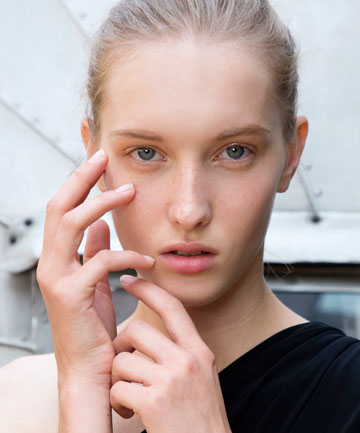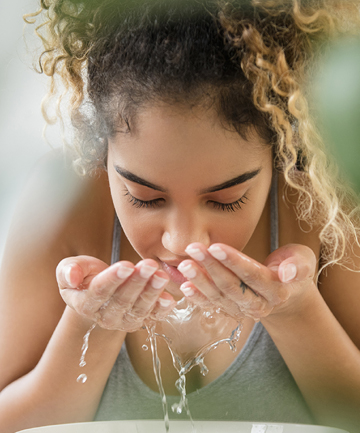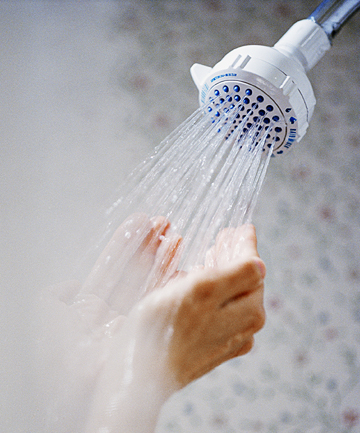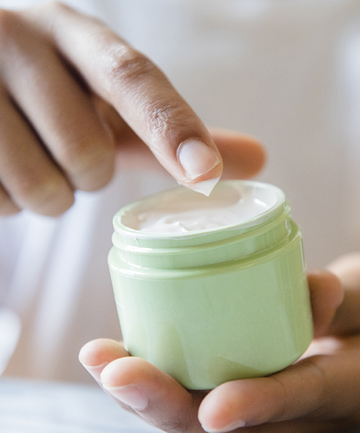Sorting through the plethora of skin care advice on the internet can be a little overwhelming. There's this ingredient to apply, that step to follow, another product that you just have to try. Let's just get straight to the basics, here. We hit up two brilliant dermatologists to find out what skin care advice was absolutely non-negotiable. You can probably guess one or two of them, but some of the others just might surprise you. We're curious to know, though — which of these rules do you actually follow? Better late than never, tbh.
Image via Imaxtree
If this was the first bit of essential skin care advice that came to mind, then you're on the right track.
"Incidental sun exposure for only 10 to 15 minutes a day adds up over time and can cause significant sun damage and accelerated photoaging," says Dr. Dendy Engelman, a cosmetic dermatologist at NYC's MDCS Dermatology. "Brief sun exposures throughout the year can add up to significant damage. These brief moments can include driving with the sunroof open or walking around outdoor shopping centers during peak sun hours (between 10 a.m. and 4 p.m.), which exposes your skin to damaging UV rays."
Even under cloud cover or when sitting next to a window, it's possible for the sun to harm your skin and eyes and cause long-term damage. Bottom line: in order to keep skin its youngest and healthiest, apply sunscreen every single day of the year.
Image via Imaxtree
Cleansing removes the day's grime and gunk and it's a step that you just can't miss.
"The first [reason why it's so important] is that it cleans the skin of oils, impurities, makeup, pollution particles, etc., all while maintaining the skin's microbiome. Nanoparticles in the skin can incite inflammation, which can accelerate the aging process," explains Engelman. "The second reason is to aid the penetration of the products you will be applying afterwards. Clean skin will allow active ingredients to penetrate better and work more effectively."
Engelman says it's really best to use a proper cleanser. Makeup wipes can potentially come in handy if you're just too tired — and it's technically better than nothing at all — but a legit cleanser is much better.
"Using a makeup wipe over again will smear old makeup and bacteria back on to your skin, instead of removing it, which is the opposite of what you are trying to achieve," Engelman says. "Leaving bacteria and toxins on the skin risks inflammation, clogged pores, breakouts and can accelerate aging over time."
In the morning, as long as you washed the night before, you can rinse your skin with water or use a wipe.
Image via JGI/Jamie Grill/Getty
On that note, let's talk water temperature.
"Hot water can strip the natural oils from your skin, leaving it dry and vulnerable to cracking, especially in the winter," Engelman says. "Losing these oils compromises our skin's barrier, thus protection from irritants. It is best to shower in warm to lukewarm water instead. This will reduce the oils that are stripped."
Image via Shannon Fagan/The Image Bank/Getty
If you're going to choose just one skin care ingredient to invest in and use regularly (not including SPF), it ought to be a retinoid product. Retinol is available over the counter, and its stronger version, retinoic acid, is available via prescription.
"Retinoids are the only scientifically proven cream to have an effect on the aging process. They help our skin exfoliate and stimulate superficial collagen, which is what our skin needs to stay youthful," says Dr. Adarsh Vijay Mudgil of NYC's Mudgil Dermatology. "They can be irritating and cause the skin to get red and flaky. Some folks may only be able to use a retinoid two to three times per week. The key here is listening to your skin."
We recommend working your way up in both potency and frequency, upping your dosage once every four weeks or so. The flaking, redness and sensitivity that Mudgil mentions is a process called "retinization" in which your skin gets used to the product. This usually passes after 12 weeks.
Image via JGI/Jamie Grill/Getty









